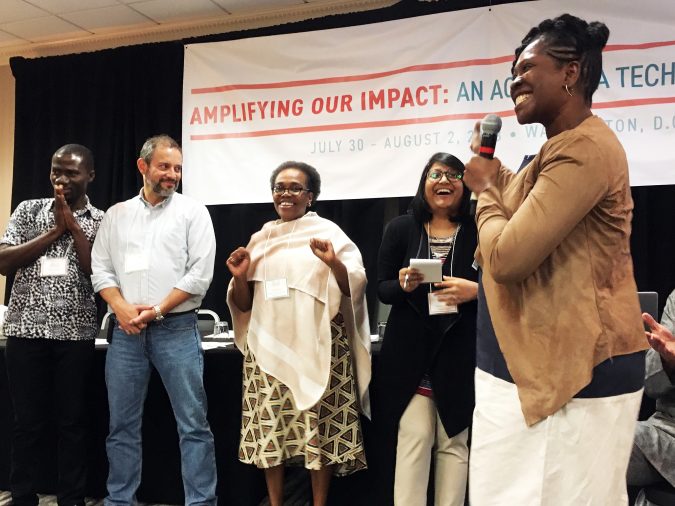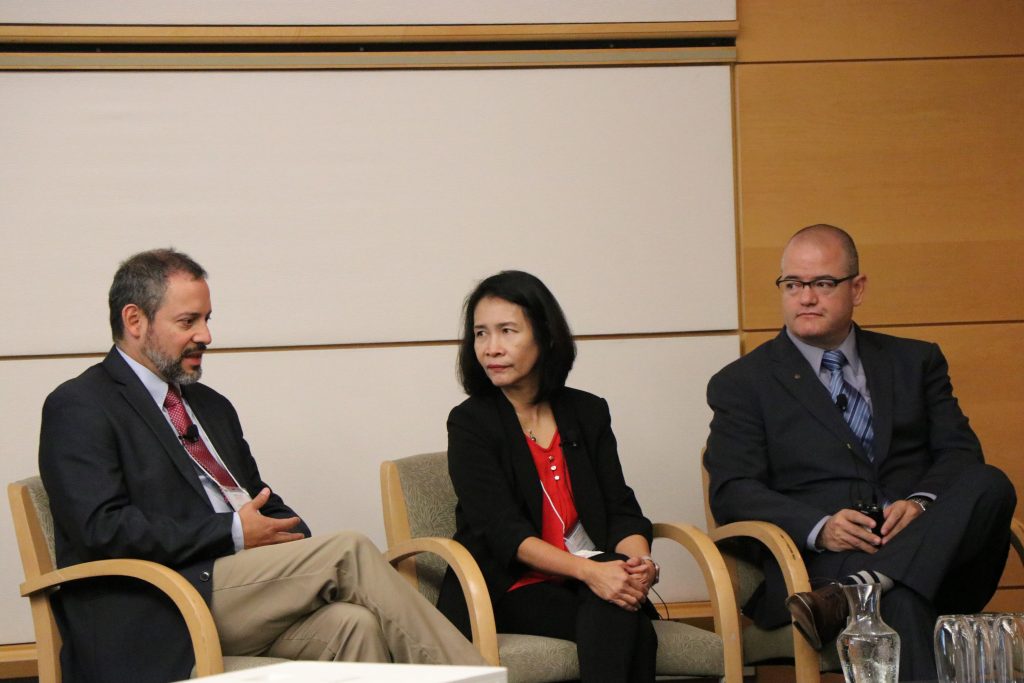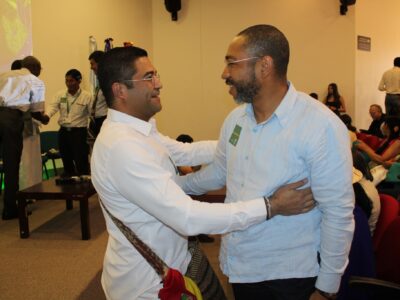
At ACDI/VOCA, our mission is to empower people to succeed in the global economy. To achieve our mission on the widest scale, we have shifted to approaches that impact not just individual producers and businesses, but the broader market systems in which they operate. Influencing the structures and dynamics of those systems offers the potential to effect meaningful and lasting change for more people.
This shift to systems thinking has been a long journey. In 2004, we supported USAID to develop the frameworks, research, and learning that launched the value chain approach to private sector development, an approach that encompasses many principles central to our work today. In 2013, ACDI/VOCA continued our partnership with USAID on the Leveraging Economic Opportunities (LEO) project to promote research and development of a systems approach to markets. LEO was influential in broadening the framework of market systems to incorporate the complex inter-relationships of value chains, economic, social, and political systems, and the underlying norms, networks, and patterns that shape behaviors and social outcomes.
ACDI/VOCA’s Inclusive Market Systems Approach
Putting this theory into practice has required a shift in how we understand and engage with market systems, and to expand our analytical rigor and toolbox to understand the root causes behind constraints, our humility to adapt strategies and activities that respond to changing and complex systems, and our use of more meaningful ways to monitor and measure systems changes.
In early August, we convened over 50 of our HQ- and field-based technical specialists and project leaders to roll out our inclusive market systems approach and to share our collective experience applying market systems tools and models in our work. At our Amplifying our Impact event at USAID, we highlighted several ACDI/VOCA projects and their experiences pivoting to a market systems approach across a variety of different geographies and contexts.
We’re thrilled to have 50+ technical specialists across 16 of our projects in #marketsystems, #gender, and monitoring & evaluation in D.C. this week! Together, we’re building a shared understanding of ACDI/VOCA’s #inclusive market systems approach to sustainable development. pic.twitter.com/IyaOgNZSLp
— ACDI/VOCA (@acdivoca) August 1, 2018
The chief of party of our Mozambique Livelihoods Empowerment and Development (LEAD) project, Cristobal Aguilar, shared his experience managing the transition of an intensive farmer training program to a market-led approach. This came after the recognition that knowledge was not the major issue facing farmers in Mozambique, but access to services and markets was needed to upgrade production practices. LEAD undertook a major shift by establishing a micro-entrepreneurship program that supported irrigation, agro-inputs, and land clearing services and facilitated relationships with market actors, such as the supplier of piri piri for the global restaurant chain Nando’s.
Aguilar shared several success factors and lessons from his experience:
- Shifting the mindset of staff to understand the “why” behind the “what” and the “how” of the project was important. With a clear understanding of project’ goals — improved livelihoods through horticulture production — it was easier to convince staff that a new approach would have more desirable outcomes. This took time, but staff eventually became strong advocates, realizing that the project could achieve more results with less effort by working through market actors who had business interest in the farmer groups that LEAD was supporting.
- Training both the program and operations teams on the market systems and business principles ensured all staff were working towards the same goals.
- Ensuring buy-in and understanding from the funder was extremely important to allow the space to pivot. Market systems frameworks and theory provided a good language to talk with the donor about why such a shift was important.

ACDI/VOCA’s Cristobal Aguilar, Agnes Luz, and Sergio Rivas at ACDI/VOCA’s learning event at USAID on August 2, 2018.
Agnes Luz, chief of party of the USAID/Kyrgyzstan Agro Horizon project shared how the project’s transition to a market systems approach achieved more transformative change in the country’s marginalized southern region. Luz shared the following learnings:
- Moving the focus beyond project targets and instead to solutions for growth and expansion created stronger buy-in and ownership from private sector partners.
- Capturing the spillover impacts across interconnected value chains and supporting market systems helped prove the impact of the new approach.
- In the case of Agro Horizon, an investment in safflower oil production opened up opportunities for business development and extension service providers for contract seed growers. Additionally, after initial grant support to partner agribusinesses firms, financial institutions moved in to offer expanded financial services to lead firms and their suppliers.
- Many of the most transformational partners were outside the target geography of southern Kyrgyzstan, but were convinced to invest in the region with Agro Horizon financial and technical support.
Sergio Rivas, chief of party of the newly awarded USAID/Honduras Transforming Market Systems (TMS) activity shared some of the early learnings from the startup phase of an activity with a strong market systems approach:
- TMS is overlaying multiple analyses, such as end market, market system, network, commercial, legal, and institutional reform, and gender and social inclusion analyses, to provide a deeper understanding of the root causes and potential leverage points of outward migration and employment in Honduras.
- Use formative analyses to vet your potential partners. ACDI/VOCA held eight different workshops across multiple sectors, and followed up with the most enlightened actors during deep-dive meetings. These actors will likely champion certain market systems solutions.
- Hiring staff who have not only technical skills, but also strong facilitation skills, such as communication, analysis, and coaching skills is critical. Technical skills are important, but can often be filled through a roster of short-term expert consultants.
Wyanie Bright of our affiliate AV Ventures draws on lessons learned from the @USDA #Ghana Poultry Project to highlight how a blended finance approach has allowed for more strategic investment in the growing poultry sector in the country. #marketsystems pic.twitter.com/d40XA75E4J
— ACDI/VOCA (@acdivoca) August 2, 2018
The event also highlighted several other initiatives spotlighting ACDI/VOCA’s pivot to an inclusive market systems approach:
-
-
- Wyanie Bright, senior director of AV Ventures, an ACDI/VOCA affiliate, shared how ACDI/VOCA is addressing the supply gap of patient and flexible capital for small- and medium-sized enterprises in Ghana through an innovative blended finance capital mechanism that pools ACDI/VOCA’s Ghana Poultry Project (GPP) grant funding from the U.S. Department of Agriculture with investment funds from the U.S. Overseas Private Investment Corporation. GPP provides technical assistance to poultry firms building a pipeline of small growth-oriented businesses that can benefit from the investment fund.
- Niry Ramasinjatovo, senior director of monitoring and evaluation for ACDI/VOCA, shared how ACDI/VOCA is adapting its monitoring, evaluation, and learning system to respond to the challenges of market systems project realities. Some of these changes include establishing market actor friendly data collection systems, shortening learning feedback and program adaptation loops, and developing tools to track systemic changes, such as sentinel and systems health indicators.
- Romain Kenfack, director of ACDI/VOCA affiliate Tanager’s SELEVER project, shared how the project is improving gender and nutrition outcomes by working with market actors in the poultry sector to expand women’s role from production to marketing. SELEVER partnered with microfinance institutions and community animal health workers to sensitize men on the benefits of women’s increased control over investment and household consumption decisions as well as embedded nutritional messaging in their training programs.
-
Kristin O’Planick, USAID’s market systems specialist, closed the event by stating that the market systems approach is gaining relevance as part of the agency’s Global Food Security Strategy and USAID Administrator Mark Green’s focus on self-reliance. By switching from direct deliver to enabling systems change, we can achieve more with our development dollars. Systems thinking is not a silver bullet, and we should be asking ourselves what the limitations are — where and when does it make sense and where does it not? ACDI/VOCA looks forward to contributing to these questions and continuing to share our experiences as we move along our market systems journey.
Comments.@KOPlanick, market systems & enterprise development specialist at @USAID, closes out today’s discussion by sharing the donor’s perspective: “We’re going to be much more deliberate about utilizing a #marketsystems approach. This is not a new approach, simply an evolution.” pic.twitter.com/RdcaNWaivg
— ACDI/VOCA (@acdivoca) August 2, 2018









